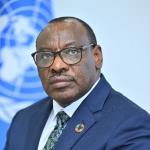The world is falling behind on achieving the Sustainable Development Goals (SDGs) by 2030, hindered by a financing gap of around $4 trillion annually. The Fourth International Conference on Financing for Development (FfD4) in June 2025 provided a once-in-a-decade opportunity to advance the urgently needed SDG investment push that is urgently needed and to reshape the global agenda of development finance to bridge this gap.
Equally important as addressing the financial divide is to bridge the digital and technological gaps. Science, technology, and innovation (STI) are critical in advancing sustainable development and global resilience. They have spurred economic growth, enhanced productivity, and significantly contributed to poverty eradication and health improvements. Furthermore, STI can be key in addressing environmental challenges such as climate change and biodiversity loss.
However, technological benefits are unevenly distributed – both between and within countries – creating divides that hinder equitable development. Rapid technological advancements also present challenges, including potential negative impacts on economies, societies, environments, and human rights. The rise of artificial intelligence (AI) and data-centric models of digital platforms raises concerns over privacy and misinformation.
Investments in education, infrastructure, and institutions, including legal and regulatory frameworks, and strengthened international cooperation on STI are essential for creating an enabling landscape for innovation and technology diffusion, which are crucial for achieving the SDGs.
Proposed guiding questions:
- How can public development banks and blended finance mechanisms be structured to prioritize high-impact, country-led STI projects that align with national SDG priorities—especially in low- and middle-income countries—while effectively de-risking private sector participation?
- What specific policy and institutional steps can governments take to integrate blended finance, catalytic capital, and public-private partnerships into national STI strategies, particularly in regions with low R&D investment and high vulnerability to technological exclusion (e.g., AI, digital infrastructure)?
- What institutional innovations or financing instruments are needed to translate high-level commitments—such as the Global Digital Compact and national STI4SDG roadmaps—into concrete, bankable projects that attract both public and private investment in underserved regions?
Chair:
- H.E. Mr. Lok Bahadur Thapa, Vice-President of ECOSOC
Presentation:
- Mr. Li Junhua, Under-Secretary-General for Economic and Social Affairs of the United Nations, presentation of the Report of the Secretary-General on “Progress towards the SDGs
(The speaking order during the session will be organized to encourage a dynamic and interactive conversation, rather than adhering strictly to protocol)
Moderator:
- Mr. Claver Gatete, Executive Secretary, United Nations Economic Commission for Africa (ECA) and Coordinator of the UN Regional Commissions
Lead speakers:
- Mr. Robert Kirkpatrick, Chairman of the Board, United Cities Foundation, Former Executive Director, UN Global Pulse
- Ms. Sanda Ojiambo, Chief Executive Officer and Executive Director, UN Global Compact
- Mr. Robbert Dijkgraaf, President-Elect, International Science Council
Lead discussant:
- Ms. Emilia Reyes, Programme Director of Policies and Budgets for Equality and Sustainable Development, Equidad de Género: Ciudadania, Trabajo y Familia
- Ms. Marcia Barbosa, Professor of Physics, Universidad Federal do Rio Grande do Sul (UFRGS)
Interactive discussion:
Due to limited time and to maximise participation, interventions in interactive discussions should be limited to two to three minutes. The time limit will be strictly implemented, using a timing device and/or microphone cutoff as necessary. Depending on the number of requests for the floor in a given discussion, the time limit may be adjusted downward, as necessary. Participants are discouraged from reading prepared statements; instead, they are encouraged to make informal remarks and engage in an interactive discussion. Priority will be given to ministerial-level interventions.
 Welcome to the United Nations
Welcome to the United Nations









